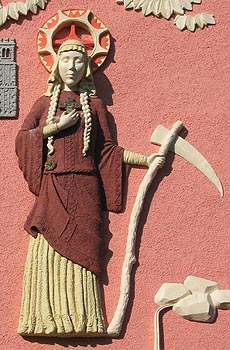 |
 |
|||
|
|
Sadfyl is a more correct form of the name commonly
anglicized to Sidwell. She was born of noble parents, the daughter of Lord
Perphir from Penychen (in South Wales). She was part of a large family of
nine brothers - amongst them Paul, Pautel, Nautel and Bana - as well
as three sisters – herself, Aude and Weluela. Their mother died when several of them were still teenagers.
Their father married again and they settled in Halstock in eastern
Dumnonia (Dorset). However, after the death of the eldest sister, Aude -
due to the plotting of the step-mother - the family seems to have moved to
Caer Uisc (Exeter). Not content with causing the downfall of one sister, the step-mother
turned her attention to young Sadfyl. She bribed a group of mowers on the
estate to murder the poor girl. So one of their number sliced off Sadfyl's
head with his scythe. A miraculous spring immediately welled up from the
ground and Sadfyl's head was thrown in. For three nights, a shaft of light
shone down over the murder-site. On the fourth night, Sadfyl's body was resurrected.
It picked up its head and walked a short distance to the spot where she
desired to be buried. St. Sidwell's, now in eastern Exeter, was built over
her grave and many miracles were wrought at her shrine. Sidwell has another church dedicated to her at Laneast in Kernow
(Cornwall). However, the association may only date from 1437. Sidwell, the
common form of Sadfyl's name has, no doubt, been influenced by the name of
her spring or holy well. Her feast day is 1st August.
Records of St. Sidwell date back to the 11th century. She is generally considered legendary.
|
|||
| © Nash Ford Publishing 2006. All Rights Reserved. | ||||





 St. Sadfyl alias St. Sidwell
St. Sadfyl alias St. Sidwell